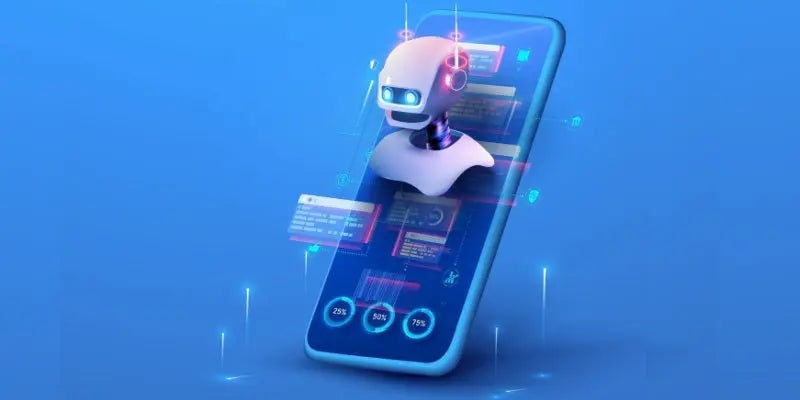Cómo la IA transforma tu experiencia con el teléfono inteligente cada día
La IA ha transformado radicalmente la forma en que usamos nuestros smartphones, transformándolos en compañeros inteligentes y adaptables. Exploremos algunas de las claves por las que la IA está transformando la experiencia con los smartphones.
Capacidades mejoradas de la cámara
Una de las formas más visibles en que la IA impacta a los smartphones es a través de las funciones de la cámara. La IA puede reconocer escenas y objetos, ajustando automáticamente la configuración para garantizar una calidad fotográfica óptima. Esto da como resultado fotos impresionantes con funciones como el desenfoque de fondo y un rendimiento mejorado con poca luz. La IA también habilita la realidad aumentada (RA), permitiendo a los usuarios superponer objetos digitales en el mundo real para juegos, aplicaciones de diseño o experiencias de aprendizaje interactivas.
Mayor duración y rendimiento de la batería
La IA puede prolongar la duración de la batería al aprender del comportamiento del usuario y optimizar el consumo de energía. Ajusta el uso de la CPU y la GPU según la tarea, lo que mejora el rendimiento y reduce el consumo de energía. Ya sea que estés jugando o simplemente navegando, la IA garantiza que tu dispositivo funcione de forma fluida y eficiente, brindándote una batería más duradera.
Experiencia de usuario personalizada
Los asistentes con IA, como el Asistente de Google y Siri, hacen que los smartphones sean más intuitivos. Permiten realizar tareas mediante comandos de voz, configurar recordatorios y controlar la configuración fácilmente. La IA también habilita funciones predictivas, sugiriendo aplicaciones según tu rutina o ofreciendo respuestas rápidas en las apps de mensajería. Tu dispositivo, en esencia, aprende de tus hábitos y se vuelve más personalizado con el tiempo.
Seguridad mejorada
La IA refuerza la seguridad de los smartphones con funciones biométricas avanzadas, como el reconocimiento facial y de voz, que proporcionan una autenticación segura y práctica. También puede detectar comportamientos inusuales que podrían indicar malware o ataques de phishing, ofreciendo protección en tiempo real. La IA también gestiona los permisos de las aplicaciones, avisándote cuando acceden a datos confidenciales como tu ubicación o el micrófono, lo que mejora tu privacidad.
Procesamiento del lenguaje en tiempo real
Para viajeros y usuarios multilingües, el procesamiento del lenguaje basado en IA es invaluable. Las funciones de traducción integradas permiten traducir texto o voz en tiempo real, incluso sin conexión. La IA también mejora la experiencia de escritura al predecir el texto y autocorregirlo según los hábitos del usuario, lo que permite escribir con mayor rapidez y precisión.
Monitoreo de la salud y el bienestar
La IA en smartphones permite el seguimiento de la actividad y la monitorización de la salud. Interpreta los datos de los sensores para registrar los pasos, el sueño y la frecuencia cardíaca, lo que promueve una mejor salud. La detección de caídas es otra función útil para la seguridad, ya que la IA puede alertar a los contactos de emergencia al detectar un movimiento repentino. Las herramientas de bienestar digital monitorizan el tiempo de pantalla y el uso de aplicaciones, lo que ayuda a los usuarios a equilibrar el uso de sus dispositivos.
Uso eficiente de datos y conectividad
La IA optimiza la conectividad seleccionando la mejor red y gestionando el ancho de banda para actividades como streaming y descargas. También puede comprimir archivos, lo que reduce el uso de datos y libera espacio de almacenamiento. Esta eficiencia es especialmente beneficiosa para usuarios con planes de datos o capacidad de almacenamiento limitados.
Conciencia contextual
La IA puede automatizar ajustes según tu ubicación, como poner tu teléfono en modo silencioso al entrar a la oficina. También ajusta la configuración según la hora o la actividad, como reducir el brillo de la pantalla por la noche. Esta percepción del contexto permite que tu dispositivo se integre a la perfección con tu rutina diaria.
En general, la IA está convirtiendo los smartphones en dispositivos proactivos que mejoran la vida diaria. Ya sea mejorando la calidad de la cámara, aumentando la seguridad o ahorrando batería, la IA transforma tu smartphone en una herramienta más inteligente y personalizada.

